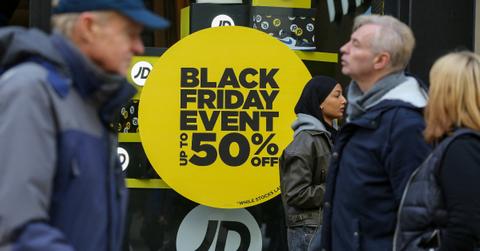There Are a Few Theories on Why It's Called Black Friday, and They're Not Pretty
Black Friday has certainly evolved over the years, but where does the name even come from?
Published Nov. 28 2024, 6:00 p.m. ET

For as long as most of us can remember, Black Friday has been hailed as one of the best — if not the best — shopping day of the year. Falling on the Friday after Thanksgiving (hence the Friday in the name), the day has been synonymous with jaw-dropping deals on everything from couches to TVs, cell phones, and clothing.
But Black Friday isn’t quite the frenzy it used to be. These days, retailers start rolling out Black Friday sales weeks in advance, making the unofficial shopping holiday feel a bit more spread out — and a little less chaotic. While we’re very much interested in what too-good-to-pass-up deals are being offered this year, we couldn’t help but wonder: Why is it even called Black Friday in the first place? Here's the story behind how it all started and how the name came to be.
Why is it called Black Friday?

The real story behind how Black Friday got its name dates back to the 1950s. According to History, the term was originally coined by police in Philadelphia. They used it to describe the chaos that unfolded the day after Thanksgiving, as locals and tourists swarmed into the city ahead of the "big Army-Navy football game" held on Saturday.
Overwhelmed officers had to work overtime to manage the large crowds, and the day’s commotion also led to a spike in shoplifting incidents.
But by 1961, the phrase “Black Friday” had gained popularity in Philadelphia.
Some even proposed changing the name to “Big Friday” in an attempt to remove the negative connotation. But by the 1980s, retailers decided to flip the script, giving the term a positive spin. They tied it to the "red to black" concept, which refers to businesses moving from operating at a loss (in the red) to turning a profit (in the black).
This rebranding shifted the focus to the sales surge and profits retailers enjoyed as eager shoppers hunted for post-Thanksgiving deals, as explained by History.
Some people believe the name "Black Friday" is rooted to the 1800s.
Though there is no factual evidence to support the notion that the name "Black Friday" stems from the 1800s, some believe it is connected to slavery. According to History, this theory suggests that Southern plantation owners purchased enslaved workers at a discount on the day after Thanksgiving.
If there were any validity to this theory, it would raise ethical concerns about continuing to celebrate or support a day linked to such a troubling history. But again, History says the theory "has no basis in fact," and perhaps that is why folks continue to shop on Black Friday.
After the term Black Friday gained nationwide attention and began to be used in a more favorable light, it became a day where shoppers would flock to stores in the early hours of the Friday after Thanksgiving to score major deals. However, with reports of fights and even deaths (yes, deaths!) happening over the years, most retailers have changed their approach.
Today, many stores close on Thanksgiving and offer deals in the days leading up to and following the holiday to avoid the chaos that Black Friday once brought.